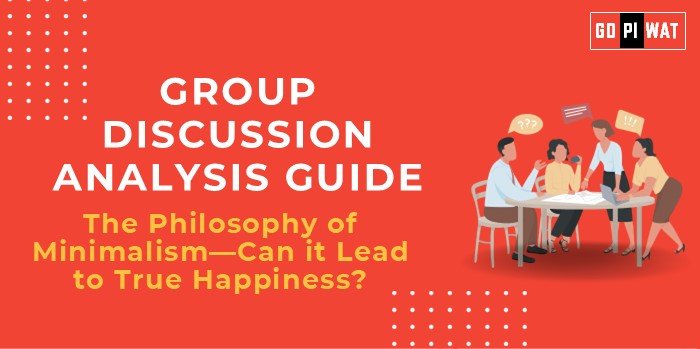📋 Group Discussion Analysis Guide: The Philosophy of Minimalism—Can it Lead to True Happiness?
🌐 Introduction to the Topic
Opening Context: “Minimalism, a lifestyle prioritizing simplicity over excess, has emerged as a counterbalance to modern consumerism, questioning whether material abundance equates to happiness.”
Background: Rooted in ancient philosophies like Stoicism and Buddhism, minimalism gained global traction through movements like Marie Kondo’s decluttering philosophy and digital minimalism trends. Its focus on intentional living resonates amidst rising mental health concerns and environmental crises.
📊 Quick Facts and Key Statistics
- 📈 Global Minimalism Movement: Searches for “minimalism” increased by 400% over the past decade (Google Trends).
- 😊 Happiness Correlation: People with fewer possessions report 22% higher life satisfaction (World Happiness Report 2023).
- 🌍 Environmental Impact: Minimalists reduce waste generation by 30% on average (UNEP, 2023).
- 💵 Economic Insight: The average minimalist household spends 40% less than non-minimalist ones (US Bureau of Economic Analysis, 2022).
👥 Stakeholders and Their Roles
- 👤 Individuals: Adopting minimalism to improve mental clarity, finances, and time management.
- 🏢 Corporations: Offering sustainable, minimalist product lines to cater to changing consumer preferences.
- 🏛️ Governments: Promoting policies on conscious consumption and waste reduction.
- 🌱 NGOs: Advocating for minimalism as a tool to combat climate change and resource depletion.
🏆 Achievements and Challenges
✨ Achievements:
- 🌿 Environmental Benefits: Reduced waste and resource usage.
- 🧠 Psychological Gains: Enhanced focus and reduced stress levels.
- 💳 Financial Discipline: Decreased reliance on debt and consumer goods.
⚠️ Challenges:
- 📜 Cultural Barriers: Materialism and consumerism deeply embedded in many societies.
- ⚖️ Economic Resistance: Reduction in consumption can impact industries dependent on high-volume sales.
- 🛠️ Access Issues: Minimalist living sometimes requires privileges not available to all (e.g., decluttering assumes access to replacement essentials).
🌐 Global Comparisons:
- 🇯🇵 Japan: Cultural emphasis on simplicity (Wabi-Sabi, Zen).
- 🇸🇪 Nordic Countries: Adoption of “Lagom” (just the right amount).
📖 Case Studies:
- 📚 Marie Kondo’s KonMari Method: Sparked a global movement advocating mindful possession.
- 🏠 California Tiny Homes: An example of architectural minimalism reducing living costs.
💬 Structured Arguments for Discussion
- ✔️ Supporting Stance: “Minimalism fosters contentment by eliminating the noise of consumerism and focusing on meaningful pursuits.”
- ❌ Opposing Stance: “Minimalism may not account for cultural, economic, and psychological diversity in defining happiness.”
- ⚖️ Balanced Perspective: “Minimalism can inspire happiness for many, but its impact varies based on individual circumstances and societal context.”
🛠️ Effective Discussion Approaches
- 🎯 Opening Approaches:
- 📊 “Statistically, minimalism reduces waste and enhances happiness—what role can it play in modern lives?”
- ❓ “While minimalism champions simplicity, does it truly align with diverse global needs?”
- 🔄 Counter-Argument Handling:
- Challenge: “Minimalism is elitist.”
- Rebuttal: “Minimalism adapts; it’s about intentionality, not deprivation, making it universally relevant.”
🔍 Strategic Analysis of Strengths and Weaknesses
- 💪 Strengths: Enhances mental health, reduces environmental impact.
- ⚡ Weaknesses: Culturally niche, requires privilege to implement fully.
- 🌟 Opportunities: Expanding reach through education and advocacy.
- ⚔️ Threats: Backlash from industries reliant on consumption.
📚 Connecting with B-School Applications
- 🌍 Real-World Applications: Case studies on sustainable business strategies.
- ❓ Sample Interview Questions:
- “How can minimalism impact financial decision-making?”
- “What lessons can B-schools learn from the minimalist movement?”
- 💡 Insights for B-School Students:
- Consider minimalism for strategic innovation and sustainability projects.
- Use its principles in personal productivity and ethical leadership.


